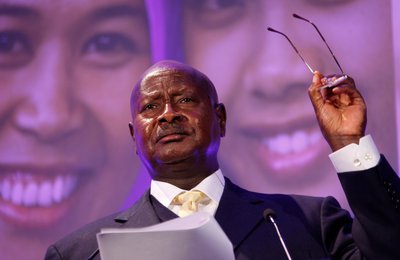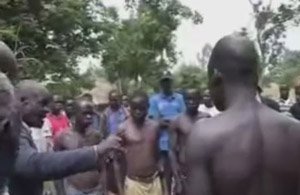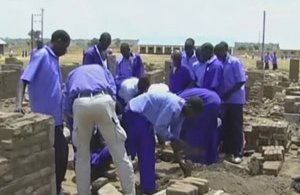Several thousands of people around the world took off their shoes and walked barefoot for kilometres to advocate for peace in northern Uganda and all areas affected by the Lord’s Resistance Army (LRA). The walk was to mark the International Day of Peace and was organised by the International Refugee Trust and local peacebuilders in northern Uganda. The UN in 1981 declared September 21 as an International Day of Peace to commemorate and strengthen the ideals of peace within and among all nations and people, and a day of global cease-fire and non-violence.
In Gulu District, a district heavily affected by 20 years of LRA insurgency, several hundreds of people marched silently barefoot. According to Nicole Fehr of the Acholi Religious Leaders Peace Initiative (ARLPI) and who participated in the march: “It was good to celebrate the international day of peace this way”. The march was graced by Bishop Gakuma, as the chief walker. Gakuma was recently elected as the new chairman of the ARLPI, which is a leading voice for inter-faith peacebuilding in northern Uganda. The march kicked off in front of the Gulu district council yard and went through Gulu town, punctuated by speeches appealing for peace. It ended at the Kawunda Ground. Archbishop John Baptist Odama, former chair of ARLPI, also spoke and participated.
The march was symbolic, a way for concerned citizens of the world to show support for victims of LRA atrocities in northern Uganda, the Democratic Republic of Congo (DR Congo), Southern Sudan and the Central African Republic (CAR). These victims have walked long distances every day in search of safety and to escape death. It is now 24 years and the LRA continues to brutalise, maim and kill hundreds of innocent civilians. They have abducted over 25,000 children and women who are forced into armed combatants or mistreated as sexual slaves. The atrocities have displaced millions of people within the Great Lakes Region and many, including women and children, continue to have to walk several kilometres barefoot each day in search of temporary safety. In 2003 over 5,000 children were forced to commute daily (‘night commuters’); each day walking barefoot for over 10 kilometres from their insecure internally displaced persons (IDP) camps to nearby town centres or hospitals in northern Uganda. This triggered two Canadian students to walk in protest and launched a worldwide movement called Gulu Walk to express solidarity with the sufferings inflicted by the LRA insurgency. Today, relative calm has returned to northern Uganda, thanks to a peace process in Juba from 2006-2008, mediated by the government of South Sudan. But the Juba peace process did not end the LRA insurgency. Instead it made them relocate to the jungles of Garamba in the Democratic Republic of Congo.
The Congolese border areas of Ri-Kwamba was agreed to be the LRA assembly point during the Juba Peace Talks. However, because of the presence of the Uganda People’s Defence Forces (UPDF), and their operations inside Sudan at the time, the LRA did not feel safe and instead scattered its forces, including its hide out in Garamba. The Juba talks had all the Agenda items (‘Cessations of Hostilities’, ‘Comprehensive Solutions to the Conflict’, ‘Accountability and Reconciliation’, ‘Permanent Cease Fire’, and 'Disarmament, Demobilisation and Reintegration') signed, except the Final Peace Agreement (FPA), which was never signed. The LRA leader Joseph Kony and his commanders refused to participate directly and sign the Final Agreement whilst there were International Criminal Court (ICC) arrest warrants in place for them. In 2008 the LRA came under a joint military attack involving four different countries in the region with support from the United States of America. The LRA eluded these attackers, scattered all over DR Congo, CAR and South Sudan and are carrying out retaliatory attacks on innocent civilians from these countries who supported the joint attacks. Over 200,000 civilians have since been killed by the LRA in these attacks in DRC and CAR. Many more have been abducted and displaced. This symbolic barefoot walk calls upon the international community to cease the opportunity for peace and end the LRA insurgency. According to the organiser of the walk and its partners around the world, “'Barefoot Peace Walk’ aims to raise international awareness of LRA activity and the urgent need to disarm them. International pressure on the four countries affected by the LRA (Uganda, DR Congo, CAR, and Sudan) is needed so that they will work together to resolve this humanitarian crisis once and for all. In May this year, US President Obama signed a bill that will allow for a budget and a strategy to assist in the capture of the LRA rebels and a long term solution for the re-integration of LRA soldiers back into the communities they originated from.
Leaders of the rebel Lord’s Resistance Army (LRA) have allegedly written to the UN Secretary General to revive the stalled Ugandan-LRA peace process to end the 24-year conflicts. According to the Ugandan government-owned newspaper New Vision on 13 September 2010, “in a September 6 letter, the LRA supporters asked the UN boss to take urgent steps to bring peace talks back on track”. The letter was signed by Justine Labeja who claimed to be acting leader of the LRA peace team. While many people question how genuine this letter and request may be, or if the LRA is now committed to a peaceful and direct negotiation to end their rebellion, peacebuilders in the region recognise that dialogue provides the best possible solution to protect civilians and end the LRA insurgency. There are of course several obstacles that a peace process with the LRA will meet, for example lack of confidence and mistrust between all parties engaging with the LRA; standing ICC indictments and warrants of arrest; geo-political developments, including indictments of President Bashir and forthcoming Sudanese referendum, general and presidential elections forthcoming in Uganda, and ongoing prosecutions of LRA commanders in Uganda for war crimes. The international community, the UN, AU and ICC and all parties within the region must commit to peace and dialogue if the plights of victims of LRA atrocities are to be answered now.
This story was contributed by Nicole Fehr, Winifred Achiro and Stephen Oola. The photos were taken by Karin Brown, Kroc Intern working with the Human Rights Focus Gulu.















